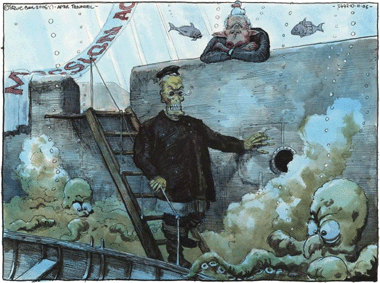It may be a long road back for Bush and Co.
 Republicans still smarting from the losses inflicted on their party this week would do very well to have a good look at the Conservative Party in Britain. They, like the Republicans, enjoyed a long period in power - in the case of Britain the Tories ruled uninterrupted for eighteen years - before the electorate turned against them.
Republicans still smarting from the losses inflicted on their party this week would do very well to have a good look at the Conservative Party in Britain. They, like the Republicans, enjoyed a long period in power - in the case of Britain the Tories ruled uninterrupted for eighteen years - before the electorate turned against them.
The Tories felt, no doubt like the Republicans do now, that a momentary glitch had taken place and that very soon the natural order of things would be restored and that they would be automatically returned to power.
Almost ten years, and three elections later, this has not turned out to be the case. I wonder if this will be the case in the US.
What is interesting, is the polar opposite way in which both countries approach their electorates.
In the UK, Blair plays relentlessly for the middle ground on the assumption that Old Labour voters, come election day, will have nowhere else to go and - though they may be dissatisfied - they will trot into the booth to vote Labour.
Karl Rove seems to be coming from a totally different perspective. He seems to concentrate totally on his core base voters, relentlessly hitting subjects that will fire them up enough to drive them to the polls - gay marriage, stem cell research etc.,. In low turnout elections this policy has a chance of success, however, as a long term strategy it is almost suicidal.
This is exactly what the Tories attempted by hitting people's fears on immigration and other social issues in the UK. In Britain, this strategy proved disastrous for the Tories and their party began to seem out of date and faintly racist. Indeed, their only real gains have happened recently when Cameron started to align them much more towards the middle ground, even if it's a middle ground that most of us assume he's faking enjoying being in.
The Republicans have yet to make any attempt to touch the middle ground, relying on the assumption that their prejudices represent "American values". This could prove to be a fatal error.
Of course, the other thing both the Republicans and the Tories have in common is that both lost their reputation for financial prudence. For the Tories it was Black Wednesday, for the Republicans it is not only a deficit that is growing at an alarming rate, but it is the President's apparent insouciance towards it. The feeling that as "a war President" he doesn't have to worry about such trifling matters. Indeed, he is the first President that I can think of who has introduced tax cuts at a time of war.
The danger for the Republicans is that, in order to guarantee future electoral success, that they will be driven to appease the group in society that they identify as their base: Christian Fundamentalists.
The Tories also tried to play to their base, in their case a group of batty old men and women who think Britain's best days were in the 1950's and who hankered after a return to simpler times and spurned modernity. The kind of people who wish multiculturalism would simply go away and who think stem cell research is "playing God".
The more the Tories tried to please them the quicker the rest of the country began to view the Tories as out of touch with the modern world.
And that is the danger for the Republicans as they try to recover from a loss that is, admittedly, mostly a result of a disastrous war.
There are times when Bush talks of abortion and stem cell research when one could be watching a Quaker talking. He seems gloriously out of touch with the rest of the planet.
No doubt many Republicans will dismiss this. They will see their problems as simply the result of a public tired of war and assume that, once that war is resolved, that the natural equilibrium - as they see it - will be restored.
That very much depends on how the Dems play things from now on. But the thing that was destroyed in the US on Tuesday was the entire neo-con movement. The belief that US power could be used at will, unilaterally, and that success would occur as a matter of course.
In both Afghanistan and Iraq, Bush has revealed not America's power, but the limitations of that power.
When the electorate fully grasp what he has done, and the scale of the foreign policy disaster that his party acquiesced in becomes apparent - with all the consequences that will flow from this - the Republican party will no longer be able to claim national security as one of their strongest cards.
Then, they really will be left playing to the nutters in the gallery. If this turns out to be the case, they may be out of power for almost as long as the British Tories.
Related Articles:
This is exactly the mindset that I am talking about:
The Architect SpeaksDespite this week's repudiation of the GOP, Rove said he believes the party can still achieve a long-term majority. "I see this as much more of a transient, passing thing," he said. "The Republican Party remains at its core a small-government, low-tax, limit-spending, traditional-values, strong-defense party. I see the power of the ideas, even in a tough year."
tag: Republican, mid-term, elections, November, Bush, United, States,























No comments:
Post a Comment